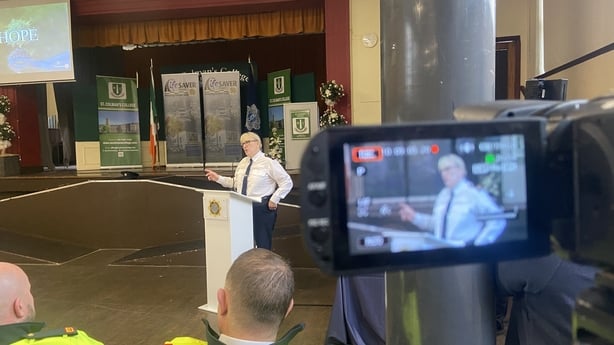A new road safety programme is being introduced to secondary schools around the country.
It comes as 152 people have been killed on Irish roads since the start of this year, a 30% increase on the same period last year.
Assistant Garda Commissioner in charge of Roads Policing and Community Engagement Paula Hilman said the education programme is aimed at 5th and 6th-year students and above but it can be extended out to other groups, such as clubs and workplaces.
It is targeted at adults and young people about to start on their "journey of driving", she said.
Speaking on RTÉ's Morning Ireland, she explained that the goal is to educate people and "bring home the absolute human tragedy and impact of road deaths in people's lives".
Ms Hilman said that the programme is "impactful" and the message is about how "we can all, by our own behaviours, help all of us to stay safe on our roads".
"Under the road safety strategy, not one area will actually deliver the results which we need, which is to reverse the absolute devastating trend that we've seen," she said.

Transition year students at St Colman's College in Fermoy were the first to receive the programme this morning as part of its nationwide rollout.
The 152 people that have died so far this year on Ireland's roads is 35 more than the figure for this time last year, and 42 more than the figure for this time in 2019, the last year before the Covid pandemic.
In addition, gardaí say they have recorded more than 900 serious injury traffic collisions up to the end of September.
The Lifesaver Project is a two-hour interactive programme with video inserts which uses frontline emergency staff, victims, their families and perpetrators to deliver its road safety message.
Groups who are interested in having the Lifesaver Project delivered to them should contact their local garda station or garda superintendent's office.
We need your consent to load this rte-player contentWe use rte-player to manage extra content that can set cookies on your device and collect data about your activity. Please review their details and accept them to load the content.Manage Preferences
Meanwhile, the Government is bringing forward legislation to increase penalty points for drivers who break the law on bank holidays and new laws would also make it mandatory for gardaí to test for drugs at the scene of road collisions, as well as changes to speed limits.
Ms Hilman said there are specific road safety plans for bank holidays and one is in place for October and there will also be similar plans in place for Christmas and the New Year.
She rejected the suggestion that the rise in road deaths is linked to fewer gardaí on roads.
Ms Hilman said: "Road safety and roads policing is a priority for An Garda Síochána, for myself as the Assistant Commissioner, for the Commissioner, if we look at all our specialist roles, roads policing has the highest number allocated to it.
"But also, I think it's very important, It's not just the specialism sits with roads policing. But about a quarter of our road safety and road policing work is also done by regular members and to highlight the work that they do on community policing teams.
"So, it really is that collective response. But I think it's back to the work that we've talked about previously under the road safety strategy to reverse the trend. It's about us in the police service, and we're not shying away from that.
"Our role in enforcement that is one of the key areas, but also what we're doing today - education".
She said that looking at certain areas in certain regions, the number of gardaí on roads policing has increased.
"While in some areas numbers have decreased and one of them is primarily in in the Dublin metropolitan region.
"In the Dublin Metropolitan region, actually it's our only region where road fatalities and serious injury collisions have decreased."
She added: "But if you look at some of our rural regions, actually numbers have increased from 2019. So again, it's just while the overall figure has decreased in individual stations, we have seen actually increases in numbers."
